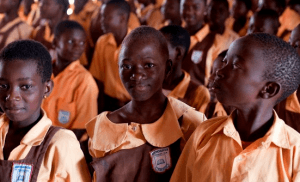Over half million citizens could get education if Ghana manages oil, minerals revenues well – UNESCO
 A new paper released by UNESCO says if Ghana better manages its oil and minerals revenue, the country could pay for over half a million Ghanaians to attend school. There are 16 other resource rich countries analysed in the paper.
A new paper released by UNESCO says if Ghana better manages its oil and minerals revenue, the country could pay for over half a million Ghanaians to attend school. There are 16 other resource rich countries analysed in the paper.
In a brief issued May 7, 2013, the paper argues that the country could achieve primary and lower secondary education for all if revenue from oil and mining is better managed.
According to the calculations of the paper, Ghana could raise $700 million a year for education if 30% of its share of mineral resources and 75% of its oil resources were converted into public revenue and 20% of this sum invested in education. “This amount is over four times the money Ghana receives in aid to education each year, and would result in an increase of 43% in the government’s education budget,” it adds.
Citing Ghana’s strong record on governance and development, the paper says that allows for cautious optimism about how the country will manage its newly discovered oil riches to reduce poverty.
“In coming years, oil revenue is expected to make up a larger proportion of government income than aid,” it noted.
According to the paper, oil revenue started to flow into government coffers in 2011, and the Petroleum Revenue Management Act was passed in April of that year.
“The Act stipulates that 50% to 70% of oil revenue will be spent through the regular budget, with a minimum of 70% going to twelve priority sectors, including human resources development and education. The remaining 30% to 50% will be put into a heritage fund (a savings fund) and a stabilization fund. Transparency is to be guaranteed by following EITI principles and adhering to a strong framework of public accountability. Reports on revenue are to be published in national newspapers and the oil funds are to undergo annual external audits,” it says.
The UNESCO “Education for All Global Monitoring Report” paper titled “Turning the resource curse into a blessing for education,” gives examples of the revenue that natural resources could bring to education, and shows that 17 of the developing countries analysed could finance access to primary school for 86% of their out-of-school children or 42% of their out of school adolescents, if they managed their revenues from natural resources better.
The paper notes that the potential gains for education are enormous. It says several countries, including Ghana, Guinea, the Lao People’s Democratic Republic, Malawi, Uganda and Zambia, could reach universal primary education without needing any more aid from donors.
The policy paper finds that an extra $5 billion in funding for education could be raised from these 17 countries per year if 30% of income from their minerals and 75% from their oil and gas was converted into public revenue and 20% of this sum invested in education .
“This is equivalent to two and a half times the amount that these countries received in aid to education in 2010. It would fill a fifth of the $26 billion financing gap needed to give all children a good quality basic education,” it says.
By Emmanuel K. Dogbevi
